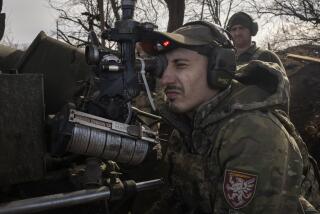Romania Acts to Avert Power Shortages
- Share via
BUCHAREST, Romania — In a move intended to avert critical shortages of energy this winter, President Nicolae Ceausescu on Friday ordered nearly half of Romania’s electric generating stations placed under military supervision.
The use of the military to perform civilian tasks is highly unusual in the Communist-ruled countries of Eastern Europe. Western diplomats said this was a drastic step clearly aimed at preventing a repetition of severe shortages of electricity and central heating that virtually paralyzed this Balkan country of 23 million people last winter, one of the coldest in this century.
There have been unconfirmed reports that hundreds of elderly people and small children perished throughout the country last winter as temperatures in many urban apartment buildings sank to between 32 and 40 degrees Fahrenheit and the use of portable electric heaters was banned.
A presidential decree published in Romanian newspapers Friday ordered the establishment of military commands at major electric generating stations, which are to “participate with full responsibility” in running the plants with their present civilian managers.
Civilian workers at the plants are to be subject to “military working conditions” and are forbidden from transferring to other jobs without the express personal permission of the minister of electric power. At the same time, Ceausescu fired the minister and a vice premier in charge of energy policy.
Government officials indicated that the decree came without warning. They said it appeared to apply only to coal-burning power plants, which have suffered from persistent repair and maintenance problems. Coal-fired power plants supply 40% of Romania’s electric power and also much of the central heating for apartment buildings.
Officials said the most immediate cause of the power emergency was a dry summer that left reservoirs on the Danube and Olt rivers, among others, at unusually low levels and reduced hydroelectric power output by as much as 35%.
The imposition of military discipline over much of the power grid comes amid severe economic problems for Romania, which has the most rigidly centralized, Stalinist-style economy in Eastern Europe.
Under a harsh austerity program, President Ceausescu, who, with his wife, Elena, exercises a distinctively personal form of authority, has voiced determination to pay off a $7-billion foreign debt by 1990. The debt figure is down from nearly $12 billion in 1981. Living standards have fallen significantly since then as the government has slashed its imports of fuel and other commodities for domestic consumption and increased exports of food and other products to pay off the debt.
Despite strict conservation regulations, including a limit of one 40-watt light bulb per room and the turning off of most street lighting, power shortages have continued to plague the country as generating plants have fallen into disrepair.
More to Read
Sign up for Essential California
The most important California stories and recommendations in your inbox every morning.
You may occasionally receive promotional content from the Los Angeles Times.












